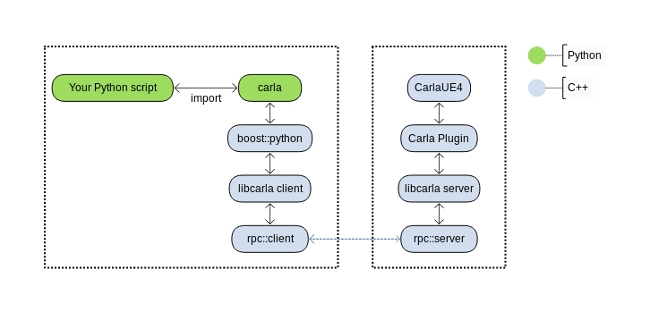3.9 KiB
Build system
This document is a work in progress, only the Linux build system is taken into account here.
The most challenging part of the setup is to compile all the dependencies and modules to be compatible with a) Unreal Engine in the server-side, and b) Python in the client-side.
The goal is to be able to call Unreal Engine's functions from a separate Python process.
In Linux, we compile CARLA and all the dependencies with clang-8.0 and C++14 standard. We however link against different runtime C++ libraries depending on where the code going to be used, since all the code that is going to be linked with Unreal Engine needs to be compiled using libc++.
Setup
Command
make setup
Get and compile dependencies
- llvm-8 (libc++ and libc++abi)
- rpclib-2.2.1 (twice, with libstdc++ and libc++)
- boost-1.72.0 (headers and boost_python for libstdc++)
- googletest-1.8.1 (with libc++)
LibCarla
Compiled with CMake (minimum version required CMake 3.9).
Command
make LibCarla
Two configurations:
| Server | Client | |
|---|---|---|
| Unit tests | Yes | No |
| Requirements | rpclib, gtest, boost | rpclib, boost |
| std runtime | LLVM's libc++ |
Default libstdc++ |
| Output | headers and test exes | ibcarla_client.a |
| Required by | Carla plugin | PythonAPI |
CarlaUnreal and Carla plugin
Both compiled at the same step with Unreal Engine build tool. They require the UE4_ROOT environment variable set.
Command
make CarlaUnrealEditor
To launch Unreal Engine's Editor run
make launch
PythonAPI
Versions 0.9.12+
Compiled using Python's setuptools ("setup.py"). Currently requires the following to be installed in the machine: Python, libpython-dev, and
libboost-python-dev, pip>=20.3, wheel, and auditwheel.
Command:
make PythonAPI
Creates two files that each contain the client library and correspond to the supported Python version on the system. One file is a .whl file and the other is an .egg file. This allows for the option of two different, mutually exclusive ways to use the client library.
A. .whl file
The
.whlis installed using the command:
pip install <wheel_file>.whl
There is no need to import the library path directly in scripts as is required in previous versions or
.eggfiles (see section Versions prior to 0.9.12);import carlais sufficient.
B. .egg file
See the section Versions prior to 0.9.12 for more information.
Versions prior to 0.9.12
Compiled using Python's setuptools ("setup.py"). Currently requires the following to be installed in the machine: Python, libpython-dev, and
libboost-python-dev.
Command
make PythonAPI
It creates two "egg" packages
PythonAPI/dist/carla-X.X.X-py2.7-linux-x86_64.eggPythonAPI/dist/carla-X.X.X-py3.7-linux-x86_64.egg
This package can be directly imported into a Python script by adding it to the system path.
#!/usr/bin/env python
import sys
sys.path.append(
'PythonAPI/dist/carla-X.X.X-py%d.%d-linux-x86_64.egg' % (sys.version_info.major,
sys.version_info.minor))
import carla
# ...
Alternatively, it can be installed with easy_install
easy_install2 --user --no-deps PythonAPI/dist/carla-X.X.X-py2.7-linux-x86_64.egg
easy_install3 --user --no-deps PythonAPI/dist/carla-X.X.X-py3.7-linux-x86_64.egg
